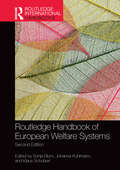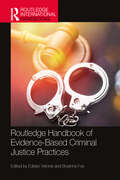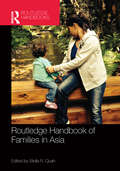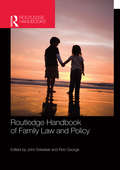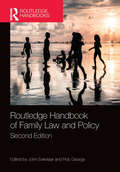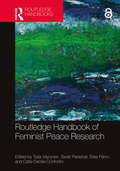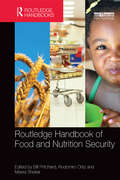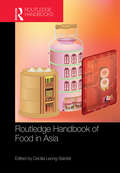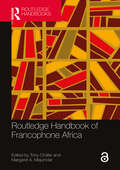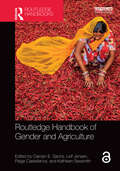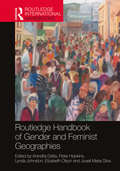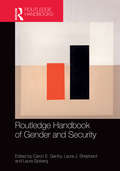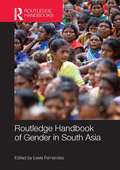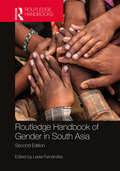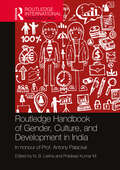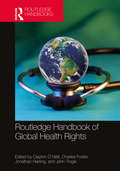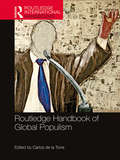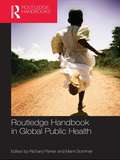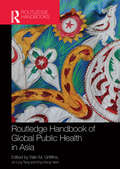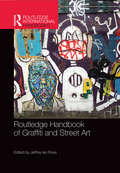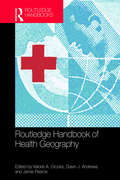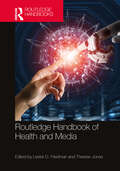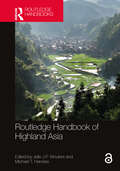- Table View
- List View
Routledge Handbook of European Welfare Systems (Routledge International Handbooks)
Published ten years after the first edition, this new Handbook offers topical, and comprehensive information on the welfare systems of all 28 EU member states and their recent reforms, giving the reader an invaluable introduction and basis for comparative welfare research. Additional chapters provide detailed information on EU social policy, as well as comparative analyses of European welfare systems and their reform pathways. For this second edition, all chapters have been updated and substantially revised, and Croatia additionally included. The second edition of this Handbook is most timely, given the often-fundamental welfare state transformations against the background of the financial and economic crises, transforming social policy ideas, as well as political shifts in a number of European countries. The book sets out to analyse these new developments when it comes to social policy. In the first part, all country chapters provide systematic and comparable information on the foundations of the different national welfare systems and their characteristics. In the second part, using a joint conceptual foundation, they focus on policy changes (especially of the last two decades) in different social policy areas, including old-age, labour market, family, healthcare, and social assistance policies. As the comparative chapters conclude, European welfare system landscapes have been in constant motion in the last two decades. While austerity is not to be seen on the aggregate level, the in-depth country studies show that all policy sectors have been characterised by different reform directions and ideas. The findings not only reveal both change and continuity, but also policy reversal as a distinct type that characterises social policy reform. The book provides a rich resource to the international welfare state research community, and is also useful for social policy teaching.
Routledge Handbook of Evidence-Based Criminal Justice Practices (Routledge International Handbooks)
by Bryanna Fox Edelyn VeronaNow more than ever, the criminal justice system, and the programs, policies, and practices within it, are subject to increased public scrutiny, due to well-founded concerns over effectiveness, fairness, and potential unintended consequences. One of the best means to address these concerns is to draw upon evidence-based approaches demonstrated to be effective through empirical research, rather than through anecdote, standard practice, or professional experience alone (National Institute of Justice, 2011). The goal of this book is to describe the most useful, actionable, and evidence-based solutions to many of the most pressing questions in the criminal justice system today. Specifically, this edited volume contains brief and accessible summaries of the best available research, alongside detailed descriptions of evidence-based practices, across different areas of the criminal justice system. It is written so that practitioners and researchers alike can use the text as reference tool in their work and in training the new generation of individuals working to improve the system. Researchers and practitioners in many areas of criminal justice – crime prevention, policing, courts (prosecution, defendants, judges), corrections, sanctions, and sentencing – can reference specific chapters in this book to guide their policy and practice decisions. Although theory is a guide for the practices described, the chapters will address practical issues in implementation and action. This book overcomes the limitations of previous criminal justice practice books in that it is written as a practice resource and reference guide and spans practices and policies across different sectors of the criminal justice system – from prevention to policing to sanctions and corrections. Each chapter contains a list of action items, based upon the best available scientific research, that can be implemented in practice to address key issues and long standing challenges in the criminal justice system.
Routledge Handbook of Families in Asia
by Stella R. QuahResearch on the family has expanded considerably across Asia but studies tend to be fragmented, focusing on narrow issues within limited areas (cities, towns, small communities) and may not be accessible to international readers. These limitations make it difficult for researchers, students, policy makers, and practitioners to obtain the information they need. The Routledge Handbook of Families in Asia fills that gap by providing a current and comprehensive analysis of Asian families by a wide range of experts in a single publication. The thirty-two chapters of this comparative and multi-disciplinary volume are organized into nine major themes: conceptual approaches, methodological issues, family life in the context of culture, family relationships across the family life cycle, issues of work and income, stress and conflict, family diversity, family policy and laws, and environmental setting of homes. Each chapter examines family life across Asian countries, studying cultural similarities and differences and exploring how families are changing and what trends are likely to develop in the future. To provide a fruitful learning experience for the reader, each chapter offers examples, relevant data, and a comprehensive list of references. Offering a complete interdisciplinary overview of families in Asia, the Handbook will be of interest to students, academics, policy makers and practitioners across the disciplines of Asian Studies, Sociology, Demography, Social Work, Law, Social Policy, Anthropology, Geography, Public Health and Architecture.
Routledge Handbook of Family Law and Policy
by John Eekelaar Rob GeorgeChanges in family structures, demographics, social attitudes and economic policies over the last sixty years have had a large impact on family lives and correspondingly on family law. This book provides global perspectives on the policy challenges facing family law and policy round the world. The chapters apply legal, sociological, demographic and social work research to explore the most significant issues that have been commanding the attention of family law policy-makers in recent years. Featuring contributions from a range of renowned global experts, the book draws on multiple jurisdictions and offers comparative analysis across a range of countries. The book addresses a range of issues including: the role of the state in supporting families and protecting the vulnerable children’s rights and parental authority sexual orientation and gender in family law the status of marriage and other forms of adult relationships divorce and separation and their consequences the relationship between civil law and the law of minority groups assisted conception movement of family members between jurisdictions This advanced level reference work will be essential reading for students, researchers and scholars of family law and social policy as well as policy makers in the field.
Routledge Handbook of Family Law and Policy, 2nd edition
by John Eekelaar Rob GeorgeChanges in family structures, demographics, social attitudes and economic policies over the last sixty years have had a large impact on family lives and correspondingly on family law. The second edition of this Handbook draws upon recent developments to provide a comprehensive and up-to-date global perspective on the policy challenges facing family law and policy round the world.The chapters apply legal, sociological, demographic and social work research to explore the most significant issues that have been commanding the attention of family law policy-makers in recent years. Featuring contributions from a range of renowned global experts, the book draws on multiple jurisdictions and offers comparative analysis across a range of countries. The book addresses a range of issues including the role of the state in supporting families and protecting the vulnerable, children’s rights and parental authority, sexual orientation, same-sex unions and gender in family law, the status of marriage and other forms of adult relationships. It also focuses on divorce and separation and their consequences, the relationship between civil law and the law of minority groups, refugees, migrants and movement of family members between jurisdictions along with assisted conception, surrogacy and adoption. This advanced level reference work will be essential reading for students, researchers and scholars of family law and social policy as well as policy makers in the field.
Routledge Handbook of Feminist Peace Research
by Tarja VäyrynenThis handbook provides a comprehensive overview of feminist approaches to questions of violence, justice, and peace. The volume argues that critical feminist thinking is necessary to analyse core peace and conflict issues and is fundamental to thinking about solutions to global problems and promoting peaceful conflict transformation. Contributions to the volume consider questions at the intersection of feminism, gender, peace, justice, and violence through interdisciplinary perspectives. The handbook engages with multiple feminisms, diverse policy concerns, and works with diverse theoretical and methodological contributions. The volume covers the gendered nature of five major themes: • Methodologies and genealogies (including theories, concepts, histories, methodologies) • Politics, power, and violence (including the ways in which violence is created, maintained, and reproduced, and the gendered dynamics of its instantiations) • Institutional and societal interventions to promote peace (including those by national, regional, and international organisations, and civil society or informal groups/bodies) • Bodies, sexualities, and health (including sexual health, biopolitics, sexual orientation) • Global inequalities (including climate change, aid, global political economy). This handbook will be of great interest to students of peace and conflict studies, security studies, feminist studies, gender studies, international relations, and politics.
Routledge Handbook of Food and Nutrition Security (Routledge Environment and Sustainability Handbooks)
by Meera Shekar Bill Pritchard Rodomiro OrtizThe concept of food and nutrition security has evolved and risen to the top of the international policy agenda over the last decade. Yet it is a complex and multi-faceted issue, requiring a broad and inter-disciplinary perspective for full understanding. This Handbook represents the most comprehensive compilation of our current knowledge of food and nutrition security from a global perspective. It is organized to reflect the wide scope of the contents, its four sections corresponding to the accepted current definitional frameworks prevailing in the work of multilateral agencies and mainstream scholarship. The first section addresses the struggles and progression of ideas and debates about the subject in recent years. The other sections focus on three key themes: how food has been, is and should be made available, including by improvements in agricultural productivity; the ways in which politico-economic and social arenas have shaped access to food; and the effects of food and nutrition systems in addressing human health, known as food utilisation. Overall, the volume synthesizes a vast field of information drawn from agriculture, soil science, climatology, economics, sociology, human and physical geography, the nutrition and health sciences, environmental science and development studies.
Routledge Handbook of Food in Asia
by Cecilia Leong-SalobirThrowing new light on how colonisation and globalization have affected the food practices of different communities in Asia, the Routledge Handbook of Food in Asia explores the changes and variations in the region’s dishes, meals and ways of eating. By demonstrating the different methodologies and theoretical approaches employed by scholars, the contributions discuss everyday food practices in Asian cultures and provide a fascinating coverage of less common phenomenon, such as the practice of wood eating and the evolution of pufferfish eating in Japan. In doing so, the handbook not only covers a wide geographical area, including Japan, Indonesia, Vietnam, Singapore, India, China, South Korea and Malaysia, but also examines the Asian diasporic communities in Canada, the United States and Australia through five key themes: Food, Identity and Diasporic Communities Food Rites and Rituals Food and the Media Food and Health Food and State Matters. Interdisciplinary in nature, this handbook is a useful reference guide for students and scholars of anthropology, sociology and world history, in addition to food history, cultural studies and Asian studies in general.
Routledge Handbook of Francophone Africa
by Tony Chafer Margaret A. MajumdarThe Routledge Handbook of Francophone Africa brings together a multidisciplinary team of international experts to reflect on the history, politics, societies, and cultures of French-speaking parts of Africa. Consisting of approximately 35% of Africa’s territory, Francophone Africa is a shifting concept, with its roots in French and Belgian colonial rule. This handbook develops and problematizes the term, with thematic sections covering: Colonial and post-colonial ties between France and sub-Saharan Africa Belgium, Belgian colonialism and Africa The Maghreb African Francophones in France Francophone African literature and film ‘Francophone’ and ‘Anglophone’ Africa Beyond national boundaries and ‘colonial partners’ The chapters demonstrate the evolution of "Francophone Africa" into a multi-dimensional construct, with both a material and an imagined reality. Materially, it defines a regional territorial space that coexists with other conceptualisations of African space and borders. Conceptually, Francophone Africa constitutes a shared linguistic and cultural space within which collective memories are shared, not least through their connection to the French imperial imagination. Overall, the Handbook demonstrates that as global power structures and relations evolve, African agency is increasingly assertive in shaping French-African relations. Bringing this important debate together into a single volume, this Handbook will be an essential resource for students and scholars interested in Francophone Africa.
Routledge Handbook of Francophone Africa
by Tony Chafer Margaret A. MajumdarThe Routledge Handbook of Francophone Africa brings together a multidisciplinary team of international experts to reflect on the history, politics, societies, and cultures of French-speaking parts of Africa.Consisting of approximately 35% of Africa’s territory, Francophone Africa is a shifting concept, with its roots in French and Belgian colonial rule. This handbook develops and problematizes the term, with thematic sections covering: Colonial and post-colonial ties between France and sub-Saharan Africa Belgium, Belgian colonialism and Africa The Maghreb African Francophones in France Francophone African literature and film ‘Francophone’ and ‘Anglophone’ Africa Beyond national boundaries and ‘colonial partners’ The chapters demonstrate the evolution of "Francophone Africa" into a multi-dimensional construct, with both a material and an imagined reality. Materially, it defines a regional territorial space that coexists with other conceptualisations of African space and borders. Conceptually, Francophone Africa constitutes a shared linguistic and cultural space within which collective memories are shared, not least through their connection to the French imperial imagination. Overall, the Handbook demonstrates that as global power structures and relations evolve, African agency is increasingly assertive in shaping French-African relations.Bringing this important debate together into a single volume, this Handbook will be an essential resource for students and scholars interested in Francophone Africa.
Routledge Handbook of Gender and Agriculture
by Carolyn E. Sachs, Leif Jensen, Paige Castellanos, and Kathleen SexsmithThe Routledge Handbook of Gender and Agriculture covers major theoretical issues as well as critical empirical shifts in gender and agriculture. Gender relations in agriculture are shifting in most regions of the world with changes in the structure of agriculture, the organization of production, international restructuring of value chains, climate change, the global pandemic, and national and multinational policy changes. This book provides a cutting-edge assessment of the field of gender and agriculture, with contributions from both leading scholars and up-and-coming academics as well as policymakers and practitioners. The handbook is organized into four parts: part 1, institutions, markets, and policies; part 2, land, labor, and agrarian transformations; part 3, knowledge, methods, and access to information; and part 4, farming people and identities. The last chapter is an epilogue from many of the contributors focusing on gender, agriculture, and shifting food systems during the coronavirus pandemic. The chapters address both historical subjects as well as ground-breaking work on gender and agriculture, which will help to chart the future of the field. The handbook has an international focus with contributions examining issues at both the global and local levels with contributors from across the world. With contributions from leading academics, policymakers, and practitioners, and with a global outlook, the Routledge Handbook of Gender and Agriculture is an essential reference volume for scholars, students, and practitioners interested in gender and agriculture.
Routledge Handbook of Gender and Feminist Geographies (Routledge International Handbooks)
by Elizabeth Peter Johnston Datta Anindita Hopkins Lynda Olson Joseli Maria SilvaThis handbook provides a comprehensive analysis of contemporary gender and feminist geographies in an international and multi-disciplinary context. It features 48 new contributions from both experienced and emerging scholars, artists and activists who critically review and appraise current spatial politics. Each chapter advances the future development of feminist geography and gender studies, as well as empirical evidence of changing relationships between gender, power, place and space. Following an introduction by the Editors, the handbook presents original work organized into four parts which engage with relevant issues including violence, resistance, agency and desire: Establishing feminist geographies Placing feminist geographies Engaging feminist geographies Doing feminist geographies The Routledge Handbook of Gender and Feminist Geographies will be an essential reference work for scholars interested in feminist geography, gender studies and geographical thought.
Routledge Handbook of Gender and Security
by Laura Sjoberg Laura J. Shepherd Caron E. GentryThis handbook provides a comprehensive look at the study of gender and security in global politics. The volume is based on the core argument that gender is conceptually necessary to thinking about central questions of security; analytically important for thinking about cause and effect in security; and politically important for considering possibilities of making the world better in the future. Contributions to the volume look at various aspects of studying gender and security through diverse lenses that engage diverse feminisms, with diverse policy concerns, and working with diverse theoretical contributions from scholars of security more broadly. It is grouped into four thematic sections: Gendered approaches to security (including theoretical, conceptual, and methodological approaches); Gendered insecurities in global politics (including the ways insecurity in global politics is distributed and read on the basis of gender); Gendered practices of security (including how policy practice and theory work together, or do not); Gendered security institutions (across a wide variety of spaces and places in global politics). This handbook will be of great interest to students of gender studies, security studies and IR in general.
Routledge Handbook of Gender and Water Governance (Routledge Environment and Sustainability Handbooks)
by Margreet Zwarteveen Tatiana Acevedo-Guerrero Lisa Bossenbroek Irene Leonardelli Seema KulkarniThis handbook provides a comprehensive overview of the field of gender and water governance, exploring how the use, management and knowledge of water resources, services and the water environment are deeply gendered.In water there is a recognized gender gap between water responsibilities and water rights and bridging this gap is likely to help achieve not just goals of equity but also those of sustainability. Building on a rich legacy of feminist water scholarship, the Routledge Handbook of Gender and Water Governance is a collection of reflections and studies that can be used as a prismatic lens into a thriving and ever proliferating array of feminist water studies. It provides a clear testimony of how hydrofeminism has evolved from rather instrumental gender and water studies to scholarship that uses feminist tools to pry open, critically reflect on and formulate alternatives to water development-as-usual. The book also shows how the community of feminists interested in studying water has diversified and expanded, from often white female scholars studying projects and gender relations in the so-called Global South, to a varied mix of scholars and activists theorizing from diverse geographical and political locations – prominently including the body. It is organized into five interconnected parts: Part I: Positionality and embodied waters Part II: Revisiting water debates: diplomacy, security, justice and heritage Part III: Sanitation stories Part IV: Precarious livelihoods Part V: New feminist futures Each of these parts brings out the gendered nature of water, shedding light on the often neglected care and unpaid labour of women and its relationship with extractivism and socioeconomic inequalities. The overall aim of the handbook is to apply social science insights to water governance challenges, creating synergies and linkages between different disciplines and scientific domains.The Routledge Handbook of Gender and Water Governance is essential reading for students, scholars and professionals interested in water governance, water security, health and sanitation, gender studies and sustainable development more broadly.
Routledge Handbook of Gender in South Asia
by Leela FernandesProviding a comprehensive overview of the study of gender in South Asia, this Handbook covers the central contributions that have defined this area and captures innovative and emerging paradigms that are shaping the future of the field. It offers a wide range of disciplinary and interdisciplinary perspectives spanning both the humanities and social sciences, focussing on India, Pakistan, Bangladesh and Sri Lanka. The Handbook brings together key experts in the field of South Asia and gender, women and sexuality. Chapters are organised thematically in five major sections: Historical formations of gender and the significance of colonialism and nationalism Law, Citizenship and the Nation Representations of Culture, Place, Identity Labour and the Economy Inequality, Activism and the State This timely survey is essential reading for scholars who research and teach on South Asia as well as for scholars in related interdisciplinary fields that focus on women and gender from comparative and transnational perspectives.
Routledge Handbook of Gender in South Asia
by Leela FernandesThis new edition of the Routledge Handbook of Gender in South Asia provides a comprehensive overview of the study of gender in South Asia. The Handbook covers the central contributions that have defi ned this area and captures innovative and emerging paradigms that are shaping the future of the field. It offers a wide range of disciplinary and interdisciplinary perspectives spanning both the humanities and social sciences, focusing on India, Pakistan, Bangladesh and Sri Lanka. This revised edition has been thoroughly updated and includes new chapters, thus adding new areas of scholarship. The Handbook is organized thematically into five major parts: • Historical formations and theoretical framings • Law, citizenship and the nation • Representations of culture, place, identity • Labor and the economy • Inequality, activism and the state The Handbook illustrates the ways in which scholarship on gender has contributed to a rethink of theoretical concepts and empirical understandings of contemporary South Asia. Finally, it focuses on new areas of inquiry that have been opened up through a focus on gender and the intersections between gender and categories, such as caste, ethnicity, sexuality, and religion. This timely study is essential reading for scholars who research and teach on South Asia as well as for scholars in related interdisciplinary fields that focus on women and gender from comparative and transnational perspectives.
Routledge Handbook of Gender, Culture, and Development in India (Routledge International Handbooks)
by N. B. Lekha Kumar M. PradeepLekha, Kumar M., and their team of contributors embark on a transformative exploration of 'Intersectionality' in the Indian context, where gender, culture, and development intersect to shape the destinies of diverse groups. Drawing from extensive research and nuanced analyses by scholars across the country and a few scholars on India from outside the country, the handbook uncovers the intricate connections between gender inequalities, cultural norms and practices, and developmental trajectories that illuminate how these factors intersect and shape the lives of individuals, communities, and societies beyond India's borders.The book encompasses discussions on the category of gender and the practice of gender studies, workspace economy, and technology. It explains the intricate intersections between gender, labour, migration, and informal economies, offering a deeper understanding of the composite factors that shape women as the workforce and their role within the workplace and the economy. It also delves into the multifaceted influences of culture on various aspects of society, including gender roles, language, agriculture, and development. The focus upon the sociocultural dimensions connected to the portrayal of gender in the media elaborated on how diverse media platforms, ranging from digital interfaces to televised serials, play a pivotal role in shaping and mirroring gender identities, roles, and societal norms within their specific environments. Most importantly, it critically engages with issues of education, marginalization, inclusion, and sustainable development. Case studies on marginalized communities such as the urban poor, elderly sweepers, and widows contribute to broader discourses on developmental paradigms vis-à-vis poverty and social exclusion.Academics, researchers, and students interested in gender, culture, and development studies will find this handbook invaluable in understanding and addressing gender inequities, cultural imbalances, and development complexities. Policymakers, NGOs, and activists committed to social progress will appreciate the evidence-based insights enabling them for informed actions and policies that transcend conventional boundaries.
Routledge Handbook of Global Health Rights
by Clayton Ó Néill, Charles Foster, Jonathan Herring, and John TingleThis book examines the idea of a fundamental entitlement to health and healthcare from a human rights perspective. The volume is based on a particular conceptual reasoning that balances critical thinking and pragmatism in the context of a universal right to health. Thus, the primary focus of the book is the relationship or contrast between rights-based discourse/jurisprudential arguments and real-life healthcare contexts. The work sets out the constraints that are imposed on a universal right to health by practical realities such as economic hardship in countries, lack of appropriate governance, and lack of support for the implementation of this right through appropriate resource allocation. It queries the degree to which the existence of this legally enshrined right and its application in instruments such as the International Covenant on Economic, Social and Cultural Rights (ICESCR) and the Universal Declaration of Human Rights (UDHR) can be more than an ephemeral aspiration but can, actually, sustain, promote, and instil good practice. It further asks if social reality and the inequalities that present themselves therein impede the implementation of laudable human rights, particularly within marginalised communities and cadres of people. It deliberates on what states and global bodies do, or could do, in practical terms to ensure that such rights are moved beyond the aspirational and become attainable and implementable. Divided into three parts, the first analyses the notion of a universal inalienable right to health(care) from jurisprudential, anthropological, legal, and ethical perspectives. The second part considers the translation of international human rights norms into specific jurisdictional healthcare contexts. With a global perspective it includes countries with very different legal, economic, and social contexts. Finally, the third part summarises the lessons learnt and provides a pathway for future action. The book will be an invaluable resource for students, academics, and policymakers working in the areas of health law and policy, and international human rights law.
Routledge Handbook of Global Populism (Routledge International Handbooks)
by Carlos de la TorreThis volume illustrates the diversity of populism globally. When seeking power, populists politicize issues, and point to problems that need to be addressed such as inequalities, the loss of national sovereignty to globalization, or the rule of unresponsive political elites. Yet their solutions tend to be problematic, simplistic, and in most instances, instead of leading to better forms of democracy, their outcomes are authoritarian. Populists use a playbook of concentrating power in the hands of the president, using the legal system instrumentally to punish critics, and attacking the media and civil society. Despite promising to empower the people, populists lead to processes of democratic erosion and even transform malfunctioning democracies into hybrid regimes. The Routledge Handbook of Global Populism provides instructors, students, and researchers with a thorough and systematic overview of the history and development of populism and analyzes the main debates. It is divided into sections on the theories of populism, on political and social theory and populism, on how populists politicize inequalities and differences, on the media and populism, on its ambiguous relationships with democratization and authoritarianism, and on the distinct regional manifestations of populism. Leading international academics from history, political science, media studies, and sociology map innovative ideas and areas of theoretical and empirical research to understand the phenomenon of global populism.
Routledge Handbook of Global Public Health
by Richard Parker Marni SommerAt the beginning of the twenty-first century, key public health issues and challenges have taken centre stage. They range from arsenic in drinking water to asthma among children and adults; from the re-emergence of cholera, to increasing cancer rates and other chronic diseases; from AIDS to malaria and hepatitis; from the crises faced by displaced or refugee populations to the new challenges that have emerged for reproductive health and rights. Like most aspects of contemporary life, these problems have been impacted by globalization. The issues that confront us are being shaped by evolving processes such as the growth of inequalities between the rich and the poor in countries around the world, the globalization of trade and commerce, new patterns of travel and migration, as well as a reduction in resources for the development and sustainability of public health infrastructures. The Routledge Handbook of Global Public Health explores this context and addresses both the emerging issues and conceptualizations of the notion of global health, along with expanding upon and highlighting the critical priorities in this rapidly evolving field. It is organized in ten main sections. The topics covered include: The transition from international to global health Structural inequalities and global public health Ecological transformation and environmental health in the global system Population and reproductive health Conflict, violence and emergencies in global public health Global public health policy and practice Global public health and development Global mental health Global access to essential medicines Health systems, health capacity, and the politics of global public health This comprehensive handbook will provide an authoritative overview for students, practitioners, researchers, and policy makers working in or concerned with public health around the globe.
Routledge Handbook of Global Public Health in Asia
by Siân M. Griffiths Jin Ling Tang Eng Kiong YeohGlobal public health is of growing concern to most governments and populations, nowhere more so than in Asia, the world’s largest and most populous continent. Whilst major advances have been made in controlling infectious diseases through public health measures as well as clinical medical treatments, the world now faces other challenges including ageing populations and the epidemic crisis of obesity and non-communicable diseases. New emerging infections continue to develop and the growing threats to health due to environmental pollution and climate change increase the need for resilience and sustainability. These threats to health are global in nature, and this Handbook will explore perspectives on current public health issues in South, Southeast and East Asia, informing global as well as regional debate. Whilst many books cite Western examples of the development of global public health, this Handbook brings together both Western and Eastern scholarship, creating a new global public health perspective suitable to face modern challenges in promoting the population’s health. This Handbook is essential reading not only for students, professionals and scholars of global public health and related fields but is also written to be accessible to those with a general interest in the health of Asia.
Routledge Handbook of Graffiti and Street Art (Routledge International Handbooks)
by Jeffrey Ian RossThe Routledge Handbook of Graffiti and Street Art integrates and reviews current scholarship in the field of graffiti and street art. Thirty-seven original contributions are organized around four sections: History, Types, and Writers/Artists of Graffiti and Street Art; Theoretical Explanations of Graffiti and Street Art/Causes of Graffiti and Street Art; Regional/Municipal Variations/Differences of Graffiti and Street Art; and, Effects of Graffiti and Street Art. Chapters are written by experts from different countries throughout the world and their expertise spans the fields of American Studies, Art Theory, Criminology, Criminal justice, Ethnography, Photography, Political Science, Psychology, Sociology, and Visual Communication. The Handbook will be of interest to researchers, instructors, advanced students, libraries, and art gallery and museum curators. This book is also accessible to practitioners and policy makers in the fields of criminal justice, law enforcement, art history, museum studies, tourism studies, and urban studies as well as members of the news media. The Handbook includes 70 images, a glossary, a chronology, and the electronic edition will be widely hyperlinked.
Routledge Handbook of Health Geography
by Jamie Pearce Gavin J. Andrews Valorie A. CrooksThe places of our daily life affect our health, well-being, and receipt of health care in complex ways. The connection between health and place has been acknowledged for centuries, and the contemporary discipline of health geography sets as its core mission to uncover and explicate all facets of this connection. The Routledge Handbook of Health Geography features 52 chapters from leading international thinkers that collectively characterize the breadth and depth of current thinking on the health–place connection. It will be of interest to students seeking an introduction to health geography as well as multidisciplinary health scholars looking to explore the intersection between health and place. This book provides a coherent synthesis of scholarship in health geography as well as multidisciplinary insights into cutting-edge research. It explores the key concepts central to appreciating the ways in which place influences our health, from the micro-space of the body to the macro-scale of entire world regions, in order to articulate historical and contemporary aspects of this influence.
Routledge Handbook of Health and Media
by Lester D. Friedman Therese JonesThe Routledge Handbook of Health and Media provides an extensive review and exploration of the myriad ways that health and media function as a symbiotic partnership that profoundly influences contemporary societies. A unique and significant volume in an expanding pedagogical field, this diverse collection of international, original, and interdisciplinary essays goes beyond issues of representation to engage in scholarly conversations about the web of networks that inextricably bind media and health to each other. Divided into sections on film, television, animation, photography, comics, advertising, social media, and print journalism, each chapter begins with a concrete text or texts, using it to raise more general and more theoretical issues about the medium in question. As such, this Handbook defines, expands, and illuminates the role that the humanities and arts play in the education and practice of healthcare professionals and in our understanding of health, illness, and disability. The Routledge Handbook of Health and Media is an invaluable reference for academics, students and health professionals engaged with cultural issues in media and medicine, popular representations of disease and disability, and the patient/professional health care encounter.
Routledge Handbook of Highland Asia
by Jelle J.P. Wouters and Michael T. HeneiseThe Routledge Handbook of Highland Asia is the first comprehensive and critical overview of the ethnographic and anthropological work in Highland Asia over the past half a century. Opening up a grand new space for critical engagement, the handbook presents Highland Asia as a world-region that cuts across the traditional divides inherited from colonial and Cold War area divisions - the Indian Subcontinent/South Asia, Southeast Asia, China/East Asia, and Central Asia. Thirty-two chapters assess the history of research, identify ethnographic trends, and evaluate a range of analytical themes that developed in particular settings of Highland Asia. They cover varied landscapes and communities, from Kyrgyzstan to India, from Bhutan to Vietnam and bring local voices and narratives relating trade and tribute, ritual and resistance, pilgrimage and prophecy, modernity and marginalization, capital and cosmos to the fore. The handbook shows that for millennia, Highland Asians have connected far-flung regions through movements of peoples, goods and ideas, and at all times have been the enactors, repositories, and mediators of world-historical processes. Taken together, the contributors and chapters subvert dominant lowland narratives by privileging primarily highland vantages that reveal Highland Asia as an ecumune and prism that refracts and generates global history, social theory, and human imagination. In the currently unfolding Asian Century, this compels us to reorient and re-envision Highland Asia, in ethnography, in theory, and in the connections between this world-region, made of hills, highlands and mountains, and a planetary context. The handbook reveals both regional commonalities and diversities, generalities and specificities, and a broad orientation to key themes in the region. An indispensable reference work, this handbook fills a significant gap in the literature and will be of interest to academics, researchers and students interested in Highland Asia, Zomia Studies, Anthropology, Comparative Politics, Conceptual History and Sociology, Southeast Asian Studies, Central Asian Studies and South Asian Studies as well as Asian Studies in general.
